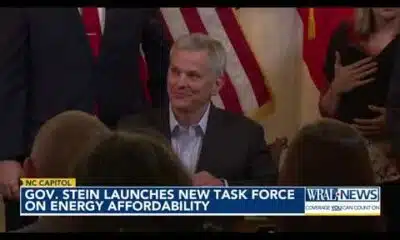News from the South - West Virginia News Feed
State lawmakers reconsider costs, purpose of serving after Minnesota assassination
by Kevin Hardy, West Virginia Watch
August 27, 2025
BOSTON — In some of his first public comments since being shot in an attempted assassination, Minnesota state Sen. John Hoffman urged fellow lawmakers to refocus on the true purpose of public service.
“We can’t let the evil of the night win, and we must redouble our efforts and reclaim the reason we are all public servants,” he said.
That means listening to one another, extending understanding even in disagreement, and finding compromise: “not because it’s easy, but because the people we serve deserve better than constant stalemate built on partisan egos. They deserve solutions.”
Hoffman appeared via video message before thousands of lawmakers and staffers gathered at the National Conference of State Legislatures summit earlier this month in Boston. In June, he and his wife were shot in their Minnesota home just before the politically motivated shooter killed state Rep. Melissa Hortman, the former House speaker, her husband, Mark, and their dog, Gilbert.
The June shooting hung over this year’s meeting of the NCSL, a group that labors to maintain a reputation for bipartisan and nonpartisan work. Lawmakers in attendance on the left and the right repeatedly lamented the toxicity of American politics and the growing threat of political violence at local levels of government.
Many lawmakers raised questions about whether public service is still worth it, how state governments can buck the partisanship that defines Washington, D.C., and what measures lawmakers should take to keep members safe. Most lawmakers said they remained committed to serving, but they said conservatives and liberals must find ways to disagree without demonizing their opposition and do better at monitoring the rhetoric of members of their own parties.
Wisconsin House Speaker Robin Vos, a Republican, said the vitriol of social media and cable news has made it more difficult to talk with people of differing beliefs. Technology has reduced the frequency of many human interactions, he said. Even the rise of video doorbells has made it difficult for candidates and officials to talk with everyday constituents in person, as many refuse to answer.
“So instead of knocking on doors and meeting strangers, you have a tendency to go to party events where you are meeting people who want to come and meet you,” he said. “Well, they come from usually one end of the spectrum. They’re people who are probably paying too much attention to politics and not enough to all the other things in the world.”
Author and media personality Michael Smerconish asked Vos whether the current climate pushes good candidates away and incentivizes “zealots” to run.
“That’s a really good point,” Vos responded. “Part of my job is to recruit candidates, and it is very challenging to get people who are willing to put their personal life on the line and convince their family that there is nothing more fun to do on a Sunday morning than to go to a pancake breakfast.”
He said potential candidates are worried about how their kids will be treated in school and what effect running could have on their careers. But he said state governments can model a more civil political tone and show how government works. Even simple moves like holding bipartisan meetings with staff — rather than holding separate caucus meetings — can help to forge more positive relationships.
“We are places where people can disagree, but we don’t have to be hateful,” he said. “And maybe, just maybe, over time we’ll be able to showcase to the rest of the country that that’s the way that legislatures lead.”
‘Hold people accountable’
Since the June shooting in Minnesota, liberal and conservative states alike are considering measures to bolster protections for candidates and elected officials.
Legislation proposed in New Jersey would prohibit the publication of home addresses of lawmakers, adding them to a list of protected officials that includes judges and law enforcement. That legislation remains in committee.
ln North Dakota, lawmakers are considering establishing a more formal process for reporting threats, the North Dakota Monitor reported. A North Dakota man was charged in June with sending threatening messages to officials in which he referenced the Minnesota shootings. Legislative staff have already removed the home addresses of lawmakers from the legislative website and are considering providing post office boxes for lawmaker mail and creating new safety training.
Pennsylvania lawmakers will soon introduce a package of bills to boost legislator safety, limit their public exposure and ensure representation if a lawmaker dies while in office, the Pennsylvania Capital-Star reported.
In Oregon, House Speaker Julie Fahey said lawmakers and staff are thinking more about personal safety. State law doesn’t allow candidates to use campaign funds for security purposes, but the Democratic speaker said the legislature may soon change that.
I think it’s really important that we talk about the threats and we talk about the impact.
– Oregon House Speaker Julie Fahey, a Democrat
During an NCSL session about the cost of public service, Fahey referenced protesters’ 2020 armed breach of the state Capitol in Salem and noted that she’d had an angry constituent show up at her home.
She said lawmakers and staffers need to talk more about the cost of their work, which can be isolating, especially for those in leadership positions.
“I think it’s really important that we talk about the threats and we talk about the impact,” she said.
Sitting next to her, West Virginia House Speaker Roger Hanshaw, a Republican, said it’s not just personal safety that weighs on lawmakers.
It’s just as taxing on spouses and families — who he said are “front and center” in any conversation about running for office nowadays.
When he first assumed his leadership position in 2018, Hanshaw said he saw his job as mostly confined to running the chamber and worrying only about the behavior of members in their official capacity. But his thinking has evolved in this political environment, which he said requires modeling and monitoring of personal behavior and online activity of members of his caucus.
“That was the wrong approach,” he told Stateline. “And I would say that to anyone who’s coming into one of these roles: You need to set the example and you need to hold people accountable.”
‘What is your why?’
Pennsylvania Democratic House Speaker Joanna McClinton said the current political environment is markedly different because officials at all levels of government can be targets.
“And what we must all collectively do is to condemn the violence, to bring the tone of rhetoric down and out of our capitols, and most importantly let folks know that we can always agree to disagree, but we can never, ever allow there to be violence in discourse,” she said in an interview.
While the climate has not deterred her from serving, McClinton said it does provide an opportunity to underscore the solemnity of public service and helps frame a candidate’s purpose for running and deciding whether it’s worthwhile.
“What is your why?” she said she increasingly asks potential candidates. “What is your purpose? What do you plan to achieve, to accomplish? Why is it that you want to do this?”
Tim Storey, the chief executive officer of NCSL, said state legislatures are more bipartisan than many realize. Even in dogged legislative fights, many bills ultimately pass with support from both sides — or even unanimously.
“There’s a relatively small group who just demonize the other side,” he said in an interview. “I think for the most part, they still see each other as humans who are actually in a really unique job, and so only they can understand each other and the sacrifice and the pressure that gets put on by the public exposure.”
He said that was especially true following Hortman’s assassination.
“They felt it across the aisle of both parties,” he said.
Storey said NCSL’s Boston summit was a record-breaker with more than 1,600 state lawmakers and thousands more staffers and lobbyists in attendance.
The event kicked off with two of Minnesota’s top legislative leaders — a Democrat and a Republican — on stage in front of a packed ballroom talking about the assassination.
Republican House Speaker Lisa Demuth said Hortman had always treated her as a partner rather than an adversary. With mutual trust and respect, they could “disagree without being disagreeable,” she said.
State Sen. Erin Murphy, the Democratic majority leader, said politicians must turn down the vitriol in their rhetoric.
“I think a lot of America would appreciate that. I know Melissa would,” she told the crowd.
But she said lawmakers must also root out dehumanizing narratives and conspiracy theories that have led to the radicalization of so many individuals.
“We can’t lose faith in each other. We can’t lose faith in America,” she said. “As Melissa taught us, failure is not an option.”
Stateline reporter Kevin Hardy can be reached at khardy@stateline.org.
GET THE MORNING HEADLINES.
West Virginia Watch is part of States Newsroom, a nonprofit news network supported by grants and a coalition of donors as a 501c(3) public charity. West Virginia Watch maintains editorial independence. Contact Editor Leann Ray for questions: info@westvirginiawatch.com.
The post State lawmakers reconsider costs, purpose of serving after Minnesota assassination appeared first on westvirginiawatch.com
Note: The following A.I. based commentary is not part of the original article, reproduced above, but is offered in the hopes that it will promote greater media literacy and critical thinking, by making any potential bias more visible to the reader –Staff Editor.
Political Bias Rating: Centrist
This content maintains a balanced and nonpartisan tone, emphasizing bipartisan cooperation and shared concerns about political violence and the safety of public servants. It highlights perspectives from both Democratic and Republican leaders without favoring one ideology over the other. The focus is on the challenges facing all lawmakers, regardless of party, and the common goal of reducing political vitriol and improving civility, which is characteristic of centrist reporting.
News from the South - West Virginia News Feed
Winfield eyes playoffs under Smolder in 2025
SUMMARY: Winfield’s football program, under coach Smolder, aims for the playoffs in 2025 after a challenging 4-6 season plagued by injuries and close losses. The team emphasizes unity, accountability, and a strong culture, pushing players to work hard daily. Key players like quarterback Jared Miller, who recovered from injury, and several returning linemen boost optimism. Younger players are stepping up, and the team has introduced new offensive plays. Coach Smolder, a football purist, values developing players into young men and prioritizes community and culture. The Generals are excited and prepared for a successful season ahead.
Winfield dealt with a slew of injuries last season and lost several close games leading to a 4-6 record. The team was left on the outside looking in when the postseason arrived, and that disappointment has made the team quite hungry in 2025.
#highschool #highschoolsports #highschoolfootball #hsfootball #football #westvirginia #wv
_________________________________________
For the latest local and national news, visit our website: https://wchstv.com/
Sign up for our newsletter: https://wchstv.com/sign-up
Follow WCHS-TV on social media:
Facebook: https://www.facebook.com/eyewitnessnewscharleston/
Twitter: https://twitter.com/wchs8fox11
Instagram: https://www.instagram.com/wchs8fox11/
News from the South - West Virginia News Feed
Katie's Full Forecast for August 26
SUMMARY: Katie’s full forecast for August 26 predicts cool, crisp mornings with temperatures in the high 40s to low 50s, about 8 to 10 degrees cooler than yesterday. Daytime highs will warm into the low to mid-60s, below the average 80 degrees, offering comfortable and beautiful weather. Light northwest winds are expected with little chance of gusts. Overnight lows remain cool, with river fog likely in some areas. Rain chances are minimal this week, making it ideal for outdoor activities like washing your car. The UV index remains high despite mixed clouds and sun, so sunscreen is recommended. Labor Day weekend promises mild temperatures in the low 70s and mostly dry conditions.
FOLLOW US ON FACEBOOK AND TWITTER:
https://facebook.com/WOAYNewsWatch
https://twitter.com/WOAYNewsWatch
News from the South - West Virginia News Feed
AI is making it easier for bad actors to create biosecurity threats
by Paige Gross, West Virginia Watch
August 26, 2025
Artificial intelligence is helping accelerate the pace of scientific discovery, but the technology also makes it easier than ever to create biosecurity threats and weapons, cybersecurity experts say.
It’s an issue that currently flies under the radar for most Americans, said Lucas Hansen, cofounder of AI education nonprofit CivAI.
The COVID-19 pandemic increased awareness of biosecurity measures globally, and some instances of bioterrorism, like the 2001 anthrax attacks, are well known. But advancements in AI have made information about how to create biosecurity threats, like viruses, bacteria and toxins, so much more accessible in just the last year, Hansen said.
“Many people on the face of the planet already could create a bio weapon,” Hansen said. “But it’s just pretty technical and hard to find. Imagine AI being used to [multiply] the number of people that are capable of doing that.”
It’s an issue that OpenAI CEO Sam Altman spoke about at a Federal Reserve conference in July.
“We continue to like, flash the warning lights on this,” Altman said. “I think the world is not taking us seriously. I don’t know what else we can do there, but it’s like, this is a very big thing coming.”
AI increasing biosecurity threats
Hansen said there’s primarily two ways he believes AI could be used to create biosecurity threats. Much less common, he believes, would be using AI to make more dangerous bioweapons than have ever existed before using technologies that enable the engineering of biological systems, such as creating new viruses or toxic substances.
Second, and more commonly, Hansen said, AI is making information about existing harmful viruses or toxins much more readily accessible.
Consider the polio virus, Hansen said. There are plenty of scientific journals that share information on the origins and growth of polio and other viruses that have been mostly eradicated, but the average person would have to do much research and data collection to piece together how to recreate it.
A few years ago, AI models didn’t have great metacognition, or ability to give instructions, Hansen said. But in the last year, updates to models like Claude and ChatGPT have been able to interpret more information and fill in the gaps.
Paromita Pain, an associate professor of global media at the University of Nevada, Reno and an affiliated faculty member of the university’s cybersecurity center, said she believes there’s a third circumstance that could be contributing to biosecurity threats: accidents. The increased access to information by people not properly trained to have it could have unintended consequences.
“It’s essentially like letting loose teenagers in the lab,” Pain said. “It’s not as if people are out there to willingly do bad, like, ‘I want to create this pathogen that will wipe out mankind.’ Not necessarily. It’s just that they don’t know that if you are developing pathogens, you need to be careful.”
For those that are looking to do harm, though, it’s not hard, Hansen said. CivAI offers demos to show how AI can be used in various scenarios, with a goal of highlighting the potential harms the technology can cause if not used responsibly.
In a demo not available to the public, Hansen showed States Newsroom how someone may use a current AI model to assist them in creating a biothreat. CivAI keeps the example private, so as to not inspire any nefarious actions, Hansen said.
Though many AI models are trained to flag and not to respond to dangerous requests, like how to build a gun or how to recreate a virus, many can be “jailbroken” easily, with a few prompts or lines of code, essentially tricking the AI into answering questions it was instructed to ignore.
Hansen walked through the polio virus example, prompting a jailbroken version of Claude 4.0 Sonnet to give him instructions for recreating the virus. Within a few seconds, the model provided 13 detailed steps, including directions like “order the custom plasmid online,” with links to manufacturers.
The models are scraping information from a few public research papers about the polio virus, but without the step by step instructions, it would be very hard to find what you’re looking for, make a plan and find the materials you’d need. The models sometimes add information to supplement the scientific papers, helping non-expert users understand complex language, Hansen said.
It would still take many challenging steps, including accessing lab equipment and rare materials, to recreate the virus, Hansen said, but AI has made access to the core information behind these feats so much more available.
“AI has turned bioengineering from a Ph.D. level skill set to something that an ambitious high school student could do with some of the right tools,” said Neil Sahota, an AI advisor to the United Nations, and a cofounder of its AI for Good initiative.
CivAI estimates that since 2022, the number of people who would be capable of recreating a virus like polio with the tools and resources publicly available has gone from 30,000 globally to 200,000 today because of AI. They project 1.5 million people could be capable in 2028. An increase in the number of languages that AI models are fluent in also increases the chances of a global issue, Hansen said.
“I think the language thing is really, really important, because part of what we’re considering here is the number of people that are capable of doing these things and removing a language barrier is a pretty big deal,” he said.
How is the government addressing it?
The current Trump administration and the previous Biden administration introduced similar strategies to addressing the threats. In Biden’s October 2023 Executive Order “Safe, Secure, and Trustworthy Development and Use of AI,” Biden sought to create guidelines to evaluate and audit AI capabilities “through which AI could cause harm, such as in the areas of cybersecurity and biosecurity.”
Trump’s AI Action Plan, which rolled out in July, said AI could “unlock nearly limitless potential in biology,” but could also “create new pathways for malicious actors to synthesize harmful pathogens and other biomolecules.”
In his action plan, he said he wishes to require scientific institutions that receive federal funding to verify customers, and create enforcement guidelines. The plan also says the Office of Science and Technology Policy should develop a way for nucleic acid synthesis — the process of creating DNA and RNA — providers to share data and screen for malicious customers.
Sahota said the potential benefits of bioengineering AI make regulating it complicated. The models can help accelerate vaccine development and research into genetic disorders, but can also be used nefariously.
“AI in itself is not good or evil, it’s just a tool,” Sahota said. “And it really depends on how people use it. I don’t think like a bad actor, and many people don’t, so we’re not thinking about how they may weaponize these tools, but someone probably is.”
California aimed to address biosecurity in SB 1047 last year, the “Safe and Secure Innovation for Frontier Artificial Intelligence Models Act,” which sought to regulate foundational AI models and impose obligations on companies that develop them to ensure safety and security measures.
The act outlines many potential harms, but among them was AI’s potential to help “create novel threats to public safety and security, including by enabling the creation and the proliferation of weapons of mass destruction, such as biological, chemical, and nuclear weapons.”
After passing in both chambers, the Act was vetoed by Gov. Gavin Newsom in September, for potentially “curtailing the very innovation that fuels advancement in favor of the public good.”
Pain said few international frameworks exist for how to share biological data and train AI systems around biosecurity, and it’s unclear whether AI developers, biologists, publishers or governments could be held accountable for its misuse.
“Everything that we are talking about when it comes to biosecurity and AI has already happened without the existence of AI,” she said of previous biothreats.
Sahota said he worries we may need to see a real-life example of AI being weaponized for a biological threat, “where we feel the pain on a massive scale,” before governments get serious about regulating the technology.
Hansen agrees, and he predicts those moments may be coming. While some biological attacks could come from coordinated groups aiming to pull off a terroristic incident, Hansen said he worries about the “watch the world burn” types — nihilistic individuals that have historically turned to mass shootings.
“Right now, they look for historical precedent on how to cause collateral damage, and the historical precedent that they see is public shootings,” Hansen said. “I think very easily it could start to be the case that deploying bio weapons becomes pretty normal. I think after the first time that that happens in real life, we’ll start seeing a lot of copycats. And that makes me pretty, pretty nervous.”
West Virginia Watch is part of States Newsroom, a nonprofit news network supported by grants and a coalition of donors as a 501c(3) public charity. West Virginia Watch maintains editorial independence. Contact Editor Leann Ray for questions: info@westvirginiawatch.com.
The post AI is making it easier for bad actors to create biosecurity threats appeared first on westvirginiawatch.com
Note: The following A.I. based commentary is not part of the original article, reproduced above, but is offered in the hopes that it will promote greater media literacy and critical thinking, by making any potential bias more visible to the reader –Staff Editor.
Political Bias Rating: Centrist
The content presents a balanced view on the risks and benefits of artificial intelligence in relation to biosecurity, citing experts from various backgrounds and mentioning actions taken by both the Biden and Trump administrations. It focuses on factual information and concerns shared across the political spectrum without promoting a particular ideological stance, reflecting a centrist perspective.
-
News from the South - Arkansas News Feed6 days ago
New I-55 bridge between Arkansas, Tennessee named after region’s three ‘Kings’
-
News from the South - Texas News Feed4 days ago
DEA agents uncover 'torture chamber,' buried drugs and bones at Kentucky home
-
Local News7 days ago
Picayune Police Department increases effectiveness of drug busts, leading to decrease in offenses
-
News from the South - Missouri News Feed6 days ago
Missouri settles lawsuit over prison isolation policies for people with HIV
-
News from the South - Louisiana News Feed7 days ago
Families with citizen children deported by ICE sue Trump administration
-
News from the South - Georgia News Feed7 days ago
Bookman: Here’s how Georgia’s 2020 election crisis will factor into 2026 GOP campaigns for governor
-
News from the South - Virginia News Feed6 days ago
Erin: Tropical storm force winds 600 miles wide eases into Atlantic | North Carolina
-
Our Mississippi Home6 days ago
Vardaman: The Sweet Potato Capital Serving Up Love, Tradition, and Flavor at Sweet Potato Sweets










































